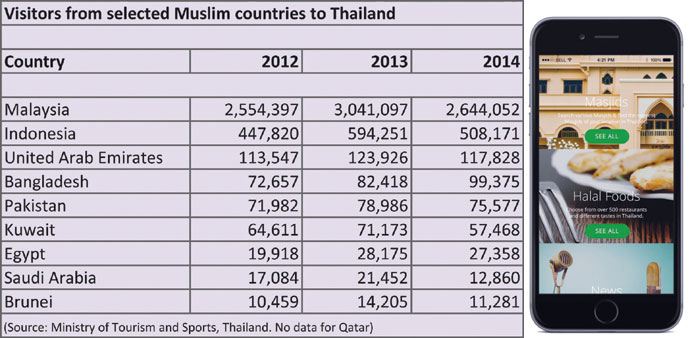The TAT’s new Muslim-friendly app to be launched on June 22 will help Muslim visitors find halal restaurants and hotels, mosques and halal tours, and provide travel news and a guidebook. Picture: TAT
By Arno Maierbrugger/Gulf Times Correspondent Bangkok
Thailand, the world’s tenth-most visited country that expects to welcome no less than 28mn foreign visitors this year, is positioning itself as a Muslim-friendly destination by pushing halal tourism and launching marketing incentives for Muslim-related agencies, the audience of this year’s Thailand Travel Mart Plus, a tourism conference and exhibition held on June 5 in Bangkok, learned.
According to Juthaporn Rerngronasa, acting governor for International Marketing – Europe, Africa, Middle East and Americas of the Tourism Authority of Thailand (TAT), marketing for Thailand as a “Muslim-friendly destination” is a “pilot project to promote Muslim visitors to Thailand,” whereby the TAT “realises the potential and readiness of Thailand to promote this market.”
At the event, a lot of information about tourism products and services for the Muslim market was provided: On how tourism organisers and travel companies can adapt to the needs of Muslim travellers, for example by showing prominent Muslim landmarks or visiting Muslim communities in Thailand, by providing prayer rooms, halal restaurants and hotels, as well as other attractions tailored for this market segment, including shopping malls, amusement parks and theme parks.
There are also initiatives to promote halal tourism in Thailand’s southern Muslim provinces bordering Malaysia, as well as incentives for Muslim travel agents and media to survey tourism products and services for Muslim tourists in Pattaya, Hua Hin and Phuket, whereby Phuket is gearing up to be a halal food centre. And nearby Krabi province, little known for being a predominantly Muslim area, is positioning itself as a premier destination for Muslim travellers.
The TAT hopes to increase the proportion of Muslim travellers especially amongst the high-end and intermediate markets, as well as family and women groups. According to the MasterCard Crescent Rating Global Muslim Travel Index 2015, Thailand was ranked second within the most popular destinations for Muslim tourists from all over world (in the category of non-Muslim countries), behind Singapore and ahead of the UK.
The Muslim population in the Association of Southeast Asian Nations (Asean) is about 240mn, which is a huge and growing market for tourism, especially from Indonesia and Malaysia which are home to the majority of Muslims in the region. The potential is expected to rise further after the Asean Economic Community 2015 comes into effect as expected by the end of this year.
Beyond the region, the TAT focuses on source market such as the Gulf Cooperation Council, especially on the UAE, Kuwait, Qatar and Oman, as well as on Iran, Egypt, Morocco, Tunisia and Algeria.
Last December, the Halal Science Centre of Bangkok’s Chulalongkorn University, the Central Islamic Council of Thailand and Halal Standard Institute of Thailand joined forces and launched “Thailand Diamond Halal”, a brand concept under which all halal products and services sourced in Thailand will be marketed, including halal tourism and halal medical tourism.
According to Prof Dr Pakorn Priyakorn, director of the Halal Standard Institute of Thailand, the brand concept can be adopted by hospitality companies, hotels and tour operators and would ensure that, among other things, hotels would be equipped with prayer facilities including ablution rooms, prayer rugs, qibla direction, women’s prayer garment and restrooms with rinse spray hoses. Prayer rooms and related facilities should also be part of public places, such as shopping malls, theme parks, offices, highway rest stops and others. Tour operators should offer Islamic heritage tours and bespoke Muslim-friendly travel packages, also for special seasons and holidays such as Ramadan, Eid al-Fitr and Eid al-Adha. Hospitals catering to medical tourist should also provide Muslim-friendly facilities throughout the country under the halal branding, Priyakorn suggested.
To find all these places, a new smartphone application in both English and Thai – and Arabic and Bahasa Indonesia at a later point of time – will be available from June 22 for both Android and iOS systems for download from the TAT’s website (www.tourismthailand.org/muslimfriendly) or from App Store or Google Play, with which Muslim travellers can find halal restaurants and hotels, mosques and halal tour operators and can read news and a Thai guidebook, says Siripakorn Cheawsamoot, executive director of TAT’s Information Technology Office.

